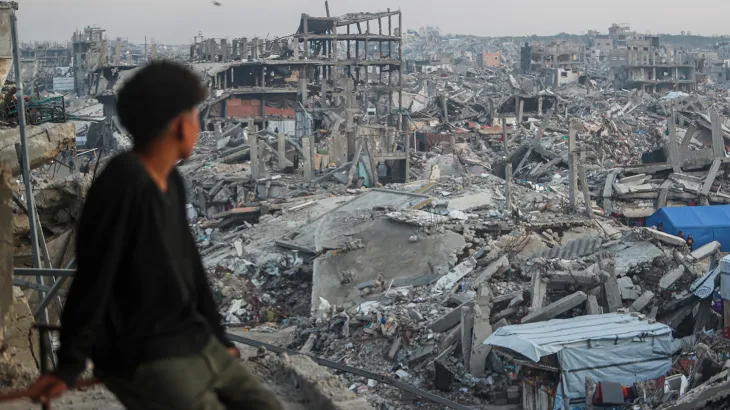The Israel-Gaza crisis has been a big worry for the world for a long time. It has caused a big humanitarian problem, affecting many people. This conflict has a long history and many reasons for its current state.
The fight between Israel and Gaza has lasted for years. It has seen calm times and violent ones. The crisis has led to many deaths and damaged buildings, affecting the economy and daily life.
The situation in Israel-Gaza is urgent, with no end in sight. The world must help solve this crisis. Understanding the conflict’s history and current situation is key to finding a solution.
Key Takeaways
- The Israel-Gaza crisis is a longstanding and complex conflict with a deep history.
- The conflict has resulted in a significant humanitarian crisis, with many people affected.
- The crisis has had a major impact on the economy and daily life in the region.
- The international community has a crucial role to play in helping to resolve the crisis.
- Understanding the complexities of the conflict and crisis is essential for achieving a lasting resolution.
- The Israel-Gaza crisis requires a comprehensive and nuanced approach to address the many challenges driving the conflict and crisis.
The Current State of the Israel-Gaza Conflict
The middle east is still in turmoil, with the Israel-Gaza conflict getting worse. News from the area shows a rise in violence, causing big humanitarian problems. It’s more important than ever to push for peace and help those in need.
The conflict has caused a lot of harm to civilians, leaving many families without homes. Humanitarian groups are doing their best to help, but it’s a huge challenge. The world needs to help these efforts by supporting peace and giving aid to those affected.
In areas hit hard by the conflict, things are very bad. There’s damage to buildings and big financial problems. It’s key for international groups to help solve this crisis. Their work in promoting peace and giving aid is vital. We must focus on helping civilians and working towards peace in the middle east.
Historical Background Leading to Present Tensions
The israel gaza conflict has deep roots, going back to the early 20th century. It’s key to understand these roots to get the current situation. The area has seen many events, agreements, and policies that have led to today’s tensions.
Records show the conflict has grown over time, with many factors playing a part. The israel gaza crisis stems from a long-standing dispute between Israelis and Palestinians. Both sides claim the land, making the conflict complex. Looking at the historical context helps us understand the current crisis.
The israel gaza conflict’s history includes key events like Israel’s creation in 1948 and the Palestinians’ displacement. These events have shaped the conflict and still affect it today. By studying the past, we can better understand the issues in the israel gaza crisis.
Trigger Points of the Current Israel-Gaza Crisis
The Israel-Gaza crisis has seen many events that have made it worse. It’s important to know what started these problems. Recent events have shown how quickly things can get out of hand.
Looking closely, we see that key moments have shaped the conflict. These moments were influenced by politics, society, and economy. The crisis has also been complicated by many different groups trying to get involved.
Big incidents like military actions and rocket attacks have marked the crisis. These have caused a lot of harm and made things worse. The world has urged calm and talks, but the situation is still unstable. Knowing what started the crisis is key to solving it.
By studying what first made things worse, the big incidents, and the turning points, we can understand the crisis better. This understanding helps us find ways to end the conflict and bring peace. The solution is to tackle the root causes and find a way that everyone can agree on.
Humanitarian Impact and Civilian Casualties
The humanitarian impact of the Israel-Gaza crisis is a pressing concern.
Civilian casualties are mounting, and essential services are severely disrupted. Reports from humanitarian organizations and news agencies show the devastating effects on civilians.
These effects include displacements and limited access to basic necessities like food, water, and healthcare. The crisis effects are far-reaching, making an already dire situation worse. Humanitarian organizations are working hard to address the crisis.
However, they face significant challenges in providing aid and assistance. The international community must continue to support these efforts. It’s crucial to emphasize the need for sustained assistance and relief.
Recent data shows an alarming number of civilian casualties, with many more injured or displaced. The humanitarian impact is not just physical harm. It also has severe psychological and emotional effects, especially on children and vulnerable populations.
As the crisis persists, it’s essential to prioritize the protection of civilians. We must also provide essential services to mitigate the humanitarian impact and crisis effects. Humanitarian organizations are calling for increased support and resources to address the crisis.
They emphasize the need for a comprehensive and sustained response. By working together, we can help alleviate the suffering of those affected. We can work towards a more stable and peaceful future.
The international community has a critical role to play in addressing the humanitarian impact of the crisis. It is essential that we prioritize the protection of civilians and the provision of essential services.
International Response to the Crisis
The world is watching the Israel-Gaza conflict closely. Many countries and groups want peace. The united states is leading diplomatic talks to stop the fighting. The united nations is helping with aid to those hurt by the conflict.
Countries are giving money and military help to their friends in the area. Egypt and Turkey are trying to help find peace. As things change, the international response will keep being important.
The united nations is sending aid like food and shelter. The united states is giving financial and military support. They’re also pushing for peace.
Reports say the united nations and regional powers are working together for peace. The united states is talking to leaders to stop the fighting. The international response will keep being key as the situation changes.
The Role of Media in the Israel-Gaza Narrative
The media shapes the story of the Israel-Gaza conflict in big ways. Different news sources offer different views on the crisis. It’s key for them to report fairly and accurately.
Harvard Kennedy School found a problem. Media often focuses on the latest events, missing the bigger picture and analysis.
Studies show the media’s story can change how people see the conflict. For example, a Journal of Conflict Resolution study found that some news focuses on the human side, while others look at the politics. Good reporting needs to understand the complex issues and show the whole story.
It’s important for news outlets to aim for balanced reporting. They should avoid sensationalism and bias. By doing this, they help people understand the conflict better. This can lead to a more informed public and help find solutions.
Peace Initiatives and Diplomatic Efforts
Nations and organizations worldwide are trying to stop the Israel-Gaza conflict. They aim to solve the crisis through talks and negotiations, not violence. The global community sees the need for peace and is working together to make it happen.
Peace plans are tackling the main issues like border disputes and security. Countries like the United States and those in Europe are helping with talks. But, finding a solution is hard because of mistrust and different interests.
Despite the hurdles, efforts for peace keep going. The United Nations and many groups are helping with aid and relief. Supporting these efforts can help make the region safer and more peaceful.
Resolving conflicts needs diplomacy and open talks. By working together and backing peace efforts, we can end the Israel-Gaza conflict. This will lead to a more peaceful future for everyone involved.
Economic Impact on Both Regions
The crisis in Israel-Gaza has big economic effects, hitting local and global markets. It worries many about long-term damage to infrastructure and financial stability. Reports show the crisis has caused a lot of damage, stopping trade and commerce.
Both sides are losing money because of the conflict. The crisis’s economic effects will last for years. It’s crucial for the world to help rebuild and recover.
Fixing the damage will need a lot of money for new roads, bridges, and buildings. We must also support local businesses to boost the economy. Understanding the crisis’s economic impact helps us find ways to lessen its effects and bring stability.
When planning to rebuild, we must think about the crisis’s economic impact. Fixing financial and infrastructure issues will lead to a better future. The crisis’s economic effects need urgent attention and support from the world.
Humanitarian Aid and Relief Efforts
The Israel-Gaza crisis is ongoing, and humanitarian aid is key. Organizations are working hard to help those affected. They deliver food, shelter, and medical care to those in need.
Many countries and groups are helping. They aim to ease the suffering of innocent people. This support is crucial.
But, delivering aid is tough. There are challenges like limited access and a lack of resources. Still, aid is reaching those who need it most. The efforts are being coordinated to help efficiently.
The world must unite to help. Together, we can change lives. We need to support humanitarian efforts to help those suffering.
By working together, we can make a big difference. We must help deliver aid and support a peaceful end to the conflict.
Future Implications for Middle East Stability
The ongoing crisis in the Middle East has big future implications for stability. Regional and international groups are studying reports and statements. They see that finding diplomatic solutions is key to solving the crisis.
The crisis has already caused a lot of damage and suffering in the region. To lessen these effects, it’s important to focus on diplomatic solutions. This way, countries can work together to achieve stability and avoid more conflict.
Regional Security Concerns
Security concerns are a big part of the crisis’s future impact. The region’s instability allows extremist groups to grow, threatening everyone. To tackle this, countries need to create and use effective security plans that rely on cooperation and diplomacy.
Potential Diplomatic Solutions
There are several diplomatic ways to solve the crisis. These include making peace agreements, starting dialogues between nations, and helping with humanitarian aid. By going after these options, countries can aim for a lasting fix to the crisis and help the Middle East become more stable. It’s crucial for countries to work together to find peaceful solutions.
Conclusion: Pathways to Resolution and Peace
The Israel-Gaza crisis shows that finding peace is hard and involves many steps. The conflict has roots in history, with both sides holding onto their stories and complaints. Yet, the suffering of people and the need for stability make finding a solution urgent.
To move forward, we need to tackle the main problems like security, land, and people’s well-being. This means talking openly, making sacrifices, and being ready to give in. The world must also help by supporting talks and helping those in need.
By choosing diplomacy, respecting human rights, and aiming for a better future, we can stop the violence. The journey is tough, but the benefits of lasting peace are huge. It’s not just for Israel and Gaza but for the whole Middle East. Let’s keep working towards a brighter future.



